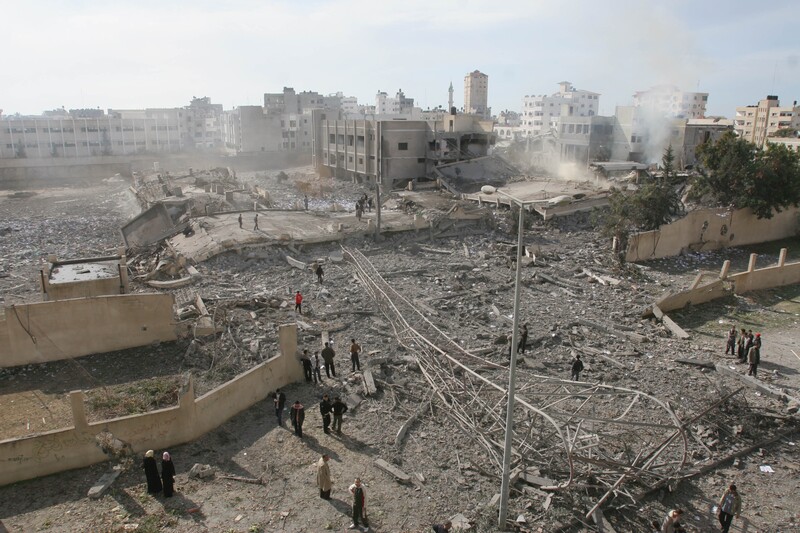Rights and Accountability 8 July 2016

A British judge has found sufficient evidence to investigate Tzipi Livni for personal responsibility for a massacre in Gaza in December 2008. (Flickr)
For the fourth time in seven years, the British government has intervened to protect Tzipi Livni, Israel’s former foreign minister, from a possible a war crimes investigation into her role in Israel’s attack on the Gaza Strip in December 2008.
Last week, ahead of her planned trip to London for a conference organized by the Tel Aviv newspaper Haaretz, Scotland Yard’s War Crimes Unit telephoned Livni to invite her to come in for a voluntary police interview.
After receiving the summons, Israel initiated “diplomatic contact” with Britain, according to Haaretz, and the UK’s Foreign Secretary arranged for Livni to receive, once again, the status of a “special diplomatic assignment.”
The police summons was prompted by the police and Crown Prosecution Service’s review of a war crimes complaint that was originally filed in 2009, Daniel Machover, an attorney representing litigants in the case, told The Electronic Intifada. But the UK government has repeatedly intervened to prevent the case from advancing.
Machover lamented “the apparent ease” with which the British government seeks “to interfere with due process by classifying otherwise private visits of suspects from ‘friendly countries’ as ‘special missions’ with a view to providing such suspects with immunity.”
The complaint was lodged by Palestinian victims of Israel’s three-week attack. They are represented by the London-based law firm Hickman and Rose, for which Machover works, and the Gaza-based Palestinian Center for Human Rights.
One of those complainants is the brother of Naim Ashouf al-Ghifari, one of 50 civilian police officers and trainees killed by an Israeli strike during a training course. Most of the casualties were found to have been performing morning fitness exercises when the missiles struck the police headquarters.
Law changed
In 2009, a British judge reviewing the complaint found that there was sufficient evidence – though it was not released – to investigate Livni for personal responsibility for the attack on the police headquarters.
Livni is not the only Israeli leader named in the complaint, but only hers was made public by media reports at the time, Hickman and Rose attorney Machover told The Electronic Intifada.
The 2009 ruling sparked outrage from political leaders in the UK, and ultimately resulted in changes restricting the application of the country’s universal jurisdiction law. The warrant that was issued after the judge’s ruling was retracted after determining it was issued in error because Livni was not in the country.
The change to the law, implemented in 2011, was supposedly meant to curb “abuses” of universal jurisdiction by requiring the consent of the Director of Public Prosecutions before an arrest warrant is issued to make it harder to prosecute foreign officials.
Yet the Scotland Yard summons last week shows that even after Britain restricted its courts and repeatedly granted special diplomatic immunity to Livni, the case for Israeli war crimes is not closed and is still being actively pursued.

Fifty civilian police officers and trainees were killed when Israeli launched a three-week assault on Gaza on 27 December 2008.
APA imagesThe allegations of war crimes committed during the winter 2008-2009 assault that left more than 1,400 Palestinians dead include shooting at civilians waving white flags, using human shields and firing white phosphorous shells on civilian targets, including a United Nations school.
After receiving diplomatic immunity, Livni declared, “I’m proud of the decisions I made as a cabinet minister in the Israeli government.”
In a comment made to Middle East Monitor, Machover wondered why Livni would refuse to meet with the police if she was so confident of her actions.
Livni joins Benny Gantz and Doron Almog, who have also been granted immunity by the UK, allowing them to avoid answering for the military orders they made that resulted in the deaths of scores of Palestinian civilians in Gaza.
Avoiding litigation
Though Israeli leaders publicly dismiss legal complaints against them, they have gone to great lengths to avoid the reach of a court order.
In the recent deal between Turkey and Israel, Israel promised $20 million to the families of victims of Israel’s lethal raid on the Turkish-owned Mavi Marmara in international waters in 2010 that left nine persons dead and fatally injured a 10th. Israel conditioned the money on Turkey passing legislation in parliament that would shield Israeli officials from prosecution.
Hakan Camuz, a spokesperson for some of the families of those killed on the Mavi Marmara, told The Electronic Intifada that he doubted such legislation would pass in parliament.
Camuz said that none of the victims’ families were consulted about the deal and all reject the proposal to withdraw their criminal complaint in Turkish courts for compensation.
Meanwhile, two civil complaints against senior Israeli officials in California and Washington, DC are currently pending.






Comments
Freedom.
Permalink R Davis replied on
These persons travel with security
I doubt if persons like this can ever travel without security
They are not safe anywhere
It must be very difficult to feel at easy when you constantly fear for your safety
Stress is the biggest killer of this century